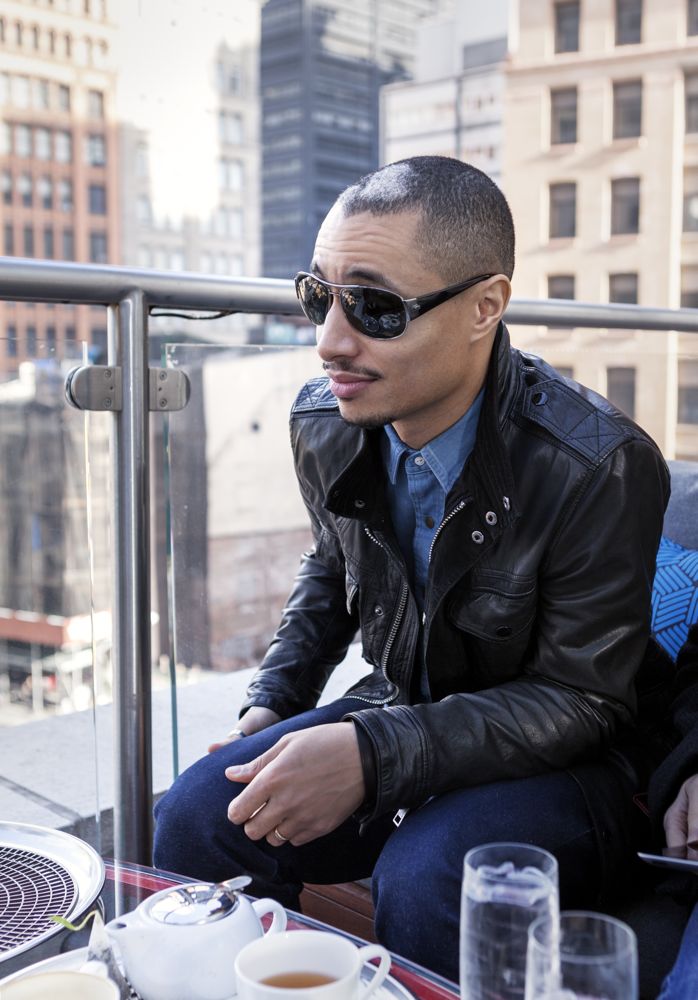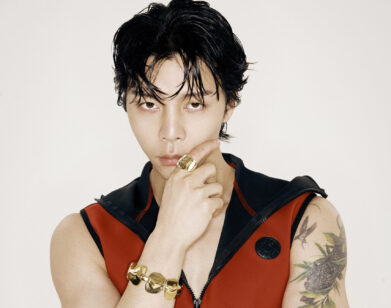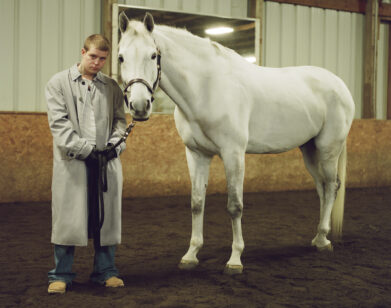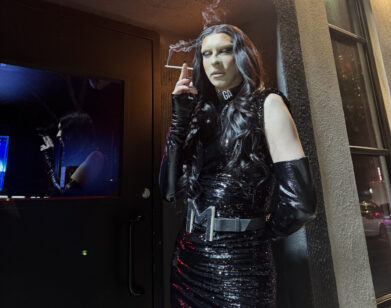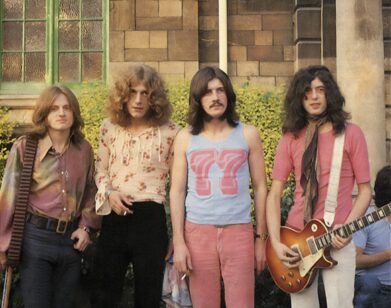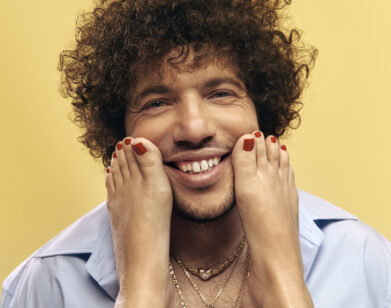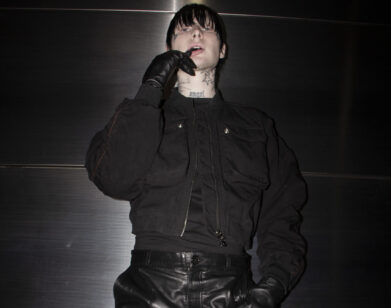The New Jazz Man: José James
If you ask José James, hip-hop is an extension of jazz music. The 33-year-old singer grew up listening to the typical ’90s mix of A Tribe Called Quest and the Beastie Boys—”I had the CDs, they had all the samples clearances on them… that’s how I got into Joe Henderson, Thelonius Monk,” he explains. “For me, jazz was always a cool thing that I associated with Ali Shaheed Muhammad and it was only later that I realized, ‘No one else listens to jazz who’s my age.’ ”
With No Beginning and No End, James’ third album and first with Blue Note Records, he is trying to reconnect the two genres. If jazz music today is divided into “easy listening” and “esoteric,” James is neither. He is not a hip-hop artist, but unlike his crooner contemporaries, his songs such as “It’s All Over Your Body” and “Sword + Gun” do not need to be framed by rap verses to feel cool. “I want to be a contemporary artist,” James emphasizes. “I’m trying to find ways to mix in all kinds of music, and not be pigeonholed.”
James is excited when we meet him and his wife, Nicola, at the W Downtown in New York. The Minneapolis-born, Brooklyn-based musician wants to talk about legendary bassist Pino Palladino, who, after working on a single song with James, decided to co-produce No Beginning and No End. Palladino’s involvement is a good sign; he’s produced some of James’ favorite albums, such as D’Angelo’s Voodoo, as well as one of the world’s favorite albums, Adele‘s 21. “He just takes the musicianship to another level,” says James.
EMMA BROWN: What is the first song you ever wrote?
JOSÉ JAMES: The first song I ever wrote with words was “The Dreamer,” from my first album. I was in school, and that was one of the best musical moments ever, because I was really searching for my identity. In New York, the jazz scene, it’s really tough.
BROWN: Tough to get into?
JAMES: Everything about it. The level of musicianship is the highest in the world. It’s tough to get into. You start gigging making 50 dollars a night, or playing for nothing to get to something. It’s insane. It’s like being a modern dancer, or something —the hardest thing to make money from. I was kind of going through—not an identity crisis—but just trying to figure out who I was. I was sitting in the practice room by myself, early in the morning, and I just started playing this really simple two-chord thing and this whole song unfolded. It felt like a real gift and this moment of clarity: “This is a new direction for you.”
BROWN: Did you always want to be a jazz-based musician?
JAMES: I think so, it sort of drew me in at a young age. I really like the complexity of it, the emotional depth; I feel like there’s no other music that’s really as satisfying as jazz.
BROWN: Did you always feel free to pursue music? Or were you discouraged because it can be so difficult to become successful?
JAMES: I felt both. Absolutely everyone was like “When are you going to outgrow this music thing?” And I’m just a super stubborn kid. I knew early on that music was the only thing that made me happy. And I think when you’re in high school—you’re 15, 16, 17—I think whatever you get attention for you sort of go into. I remember starting high school, when I was like, 14 and the next year, that’s when everyone grew—all the guys shot up—and were playing basketball. All of a sudden I was, like, the shortest dude—it was a crazy basketball school. And I ran track, but it wasn’t really satisfying. And I started singing and it was like, “Oh, this is what I can do.” So I think that’s the reason I stuck with it. I never really thought about this, but it was clear that there was nothing else I was really exceptional at.
BROWN: When did you grow, then? Because you aren’t short…
JAMES: I wasn’t short short. I just wasn’t tall enough to play basketball.
BROWN: What kind of music did you listen to growing up?
JAMES: Nirvana. All the normal stuff: A Tribe Called Quest, Beastie Boys. I remember the first vinyl I bought: Purple Rain, my favorite Prince album, ever.
BROWN: What’s the last album you bought?
JAMES: The last vinyl I bought was the new Grizzly Bear album.
BROWN: So you weren’t a weird jazz music geek.
JAMES: I was weird because of all the Blue Note stuff that I was into. [But] for me it was kind of an extension of hip-hop. I had the CDs, they had all the samples clearances and that fascinated me—I didn’t understand what it was and I would try and go and check out all this stuff. That’s how I got into Joe Henderson, Thelonius Monk, and all that kind of stuff. So for me, jazz was always this cool thing that I associated with Ali Shaheed Muhammad [of A Tribe Called Quest] and it was only later that I realized, “No one else listens to jazz who’s my age.” [laughs] Kind of the sad thing is that—it’s still true—a lot of jazz people just listen to jazz, and a lot of hip-hop people just listen to hip-hop, and there’s not a lot of crossover, unfortunately.
BROWN: I wonder where they get their sample ideas from.
JAMES: Well, producers listen to everything.
BROWN: Were you in a high school band?
JAMES: I was in two bands. I had an a capella band—you can laugh. Called “Cerulean.” I was 16 years old. It was three of us singing old doo-wop. And then I started a jazz group and that was my beginnings of being a bandleader. Minneapolis is a really easy place to get started, there’s a lot of funding, so we could play at clubs and performance art spaces.
BROWN: Did you have groupies in high school?
JAMES: No. I was a total weird kid. I went to a Catholic high school and I was super rebellious. I would dress weird, or play jazz. I was definitely pushing against whatever was going on.
BROWN: I watched an interview between you and Robert Glasper. You were talking about how people are tempted to make jazz complicated, but sometimes it just needs to be simple. Do you begin simply? Or do you start with something complicated and strip it down?
JAMES: I think it depends on each song. For example, the two songs written by Emily King [“Heaven on the Ground” and “Come to My Door”], she writes a lot more simply than I can ever comfortably do. And it’s great. That’s why I reached out to her. So for her stuff, I produced it in a way that started really simple and then layered it. With my stuff I would say, unfortunately, it starts more complicated, and I have to kind of bring it down. We did a lot of horn arrangements that were just too much, and then we had to pare it back, extra guitar stuff. I feel like that’s kind of my style as a producer, too, I like to try a lot of different things, see what works. It’s easy to take stuff off, than add stuff later.
BROWN: Who is your most surprising fan?
JAMES: Actually, Jill Scott’s son is apparently a huge fan; she’s always tweeting about it. I’ve never met either of them in person, but I think that’s so sweet. [chuckles] Her little son listens to my music. I think he’s seven years old. Isn’t that really cute? But the fans in Japan are definitely the most hardcore: they come to the show, they have all the rare remixes on vinyl— imports from London—they know everybody I’ve worked with. It’s kind of insane. The interviewers in Japan, they know more about me than I do. Seriously, it’s crazy. They were asking me about stuff from high school. I was like, “Wow—you shouldn’t know where I went to high school, that’s so weird!” [chuckles]
BROWN: What do you do when you get writer’s block?
JAMES: [pauses] I don’t, I really don’t. I don’t try to write anything; when something comes, I write it. I just practice and when I get an idea I write it down. [to his wife Nicola Giardina] People are going to hate me. [laughs]
BROWN: When you have a new song and you’re really excited about it, who is the first person you play it to, to get some objective feedback?
JAMES : [to Nicola] I think you, right?
BROWN: [to Nicola] Are you honest?
NICOLA GIARDINA : [unconvincingly] Yeah… [laughs] No, I’ll tell him if I don’t like something.
JAMES: That’s true.
NICOLA GIARDINA : But he’ll probably go ahead with it anyway.
JAMES: I totally trust your opinion, on everything. She knows the progression, the process.
BROWN: You mentioned you’re already writing your next album, how is it shaping up?
JAMES: It’s so early, I’m sort of pulling different ideas down from different places. I’m playing a lot of guitar now, though, so it’s definitely going to have more guitar—acoustic and electric guitar.
BROWN: What got you into the guitar?
JAMES: I used to play in high school, and it was really hard. I just got lazy and started singing instead, which came a lot more naturally. And then, Emily King—actually, there’s a lot of guitar on this album, on four, five tracks—and then when I recorded with her in Paris for It’s All Over Your Body, we didn’t have a band. It was just me and her, we did all the percussion. She started playing guitar, and was like “Grab a guitar!” I started playing, and it felt really good. We used three of my guitar parts on the track, so she pushed me back into it. I didn’t really have an excuse, after that.
BROWN: I like the patterns in your hair. How long have you had it like this way?
JAMES: Since we moved back to New York. I started going to Frank’s Chop Shop, and I found this cool guy, Hiro. He’s got really cool tattoos on his arms—he’d probably hate that I’m talking about him, he’s super secretive—But I was like, “Oh, I really love your tattoos.” They’re kind of wave style. So, everything’s based on that. We’ve done like, 40 styles so far.
BROWN: Do you take a picture of each one?
JAMES: I started to, but I stopped because it was just kind of getting annoying. And every time I would post one of them on Instagram, I would get all these crazy remarks. Some people loved it and some people hated it—”It’s so ugly!”
BROWN: Just random fans?
JAMES: Oh yeah. People are so free to say whatever about anything on the internet.
BROWN: How do you entertain yourself outside of music?
NICOLA GIARDINA : He’s writing a novel.
JAMES: It’s a crime novel. A New York crime novel. I’m trying to get the right tone of it, but it’s sort of abstract, surrealist.
BROWN: Like Paul Auster?
JAMES: Yes, but not that scary. He terrifies me. I can’t read him anymore, because I get nightmares. Like The New York Trilogy —my uncle gave it to me and I was terrified.
NICOLA GIARDINA : Like Walter Mosley.
JAMES: Yea, more like Walter Mosley. But it’s going to be darker. Somewhere between Paul Auster and Walter Monsey. My goal is to write one book of fiction, and that’s all I want to do. It takes so much time, and I don’t really have enough time. But I admire writers so much. Nicola’s dad was a writer, and I love reading his books. He’s so disciplined. He writes every day. And I write whenever I can, which is rarely.
JOSÉ JAMES IS PLAYING TOMORROW, DECEMBER 18 ON CONAN ON TBS. NO BEGINNING AND NO END COMES OUT JANUARY 22, 2013 AND IS AVAILABLE TO PRE-ORDER ON iTUNES.
To see more of our 13 Faces of 2013, click here.

